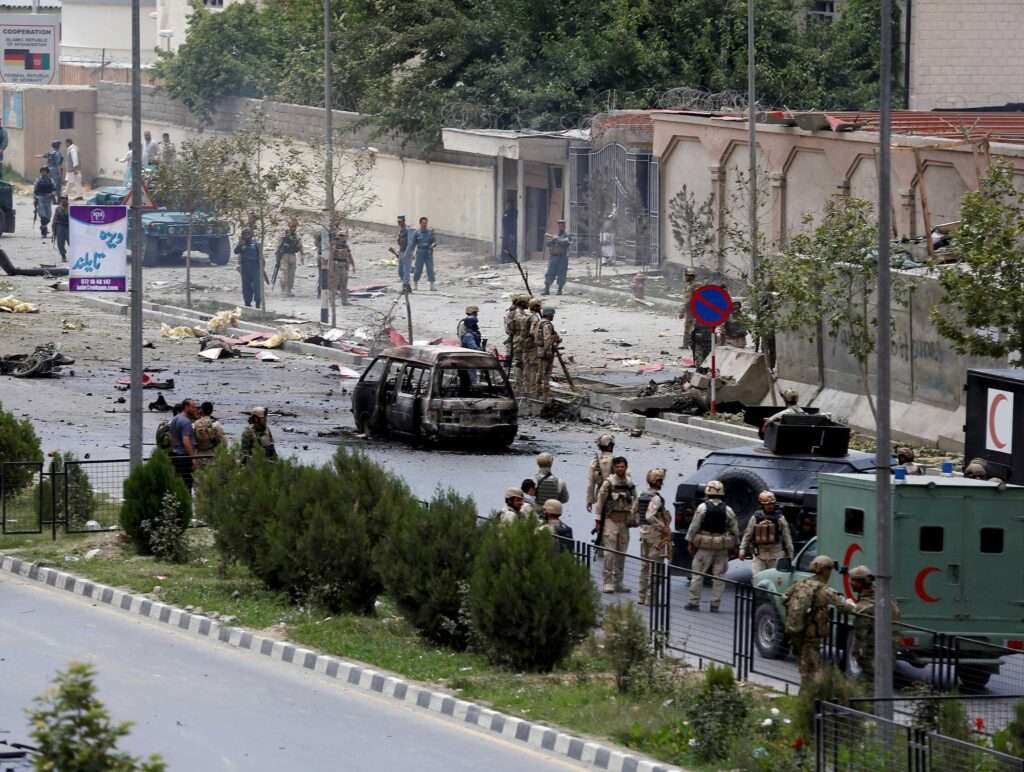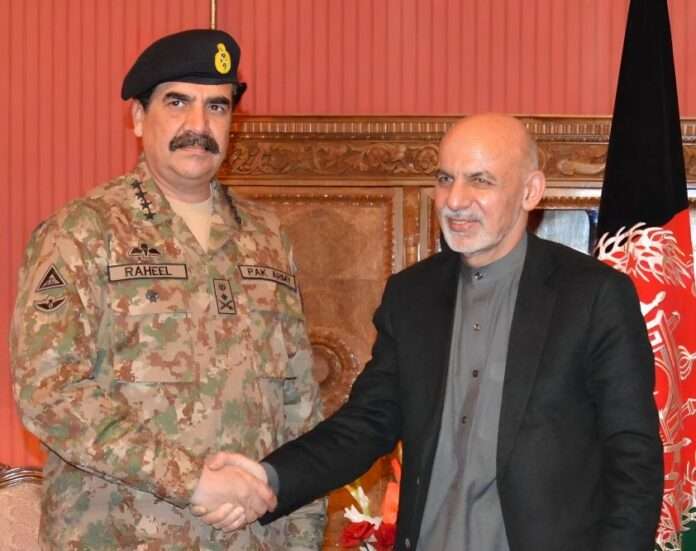As the Afghan peace process is learning the ropes, attendant issues keep surfacing time and again. However, despite fragility, the process is poised to move forward, albeit in inches. Those who have stakes in keeping the country unstable are working overtime to impede the peace process and as a starting point, effort is on to undo the thaw in Pak-Afghan relations. President Ashraf Ghani is doing well by not subscribing to the disrupters of peace efforts; he is indeed emerging as a statesman par excellence. If he is able to hold to present course, he will be able to make significant contributions in intra-Afghan reconciliation and peace making. Time has come for a paradigm shift in the stated position by the Afghan government as well as Taliban, and in this context, the Afghan government owes unleashing of the proverbial first drop of the rain—political concessions for the resistance groups.
As the fighting season peaks in Afghanistan, relics from Karzai era have stepped up their effort to create disjunction in Pak-Afghan joint counter terrorism effort. One rudimentary way is to blame anything that goes wrong in Afghanistan on Pakistan. This strategy has many plusses for its proponents: it reduces public confidence in intra-Afghan reconciliation process; covers own inefficiency in terms of intelligence gathering and preemptive operations; pleases the pay masters and reverse paddles ongoing efforts for peace process.
Going by its track record, Afghanistan’s intelligence outfit National Directorate of Security (NDS) has once again stated that the recent terrorist attack on the parliament in Kabul was carried out by Haqqani Network in line with a plan finalized by an officer of Pakistan’s Inter-Services Intelligence (ISI) agency. NDS spokesman Abdul Haseeb Siddiqui told the Pajhwok Afghan News agency that 7.5 million Pakistani rupees had been set aside for the attack. And that the NDS had dispatched prior information to the ministries of defence and interior about the possibility of such an attack, Siddiqui added.
Here a few interesting questions arise: whom would the derailing of ongoing up-trajectory of Pak-Afghan relations benefit?; Which are the elements from within Afghanistan who are fearful of success of intra Afghan peace process; Who benefits the most from a peaceful Afghanistan?; and In whose interest it is to keep the Afghanistan pot boiling?
Derailing of thaw in Pak-Afghan relations suits those elements in Afghanistan who are beneficiary of politico-economic system that has evolved as a result of excluding Taliban, and as a corollary, single ethnic majority— Pushtuns— from the current political arrangement. These are non-Pushtun ethnic groups which enjoy a larger share of the pie and any settlement with the Taliban would mean sharing the political power with them too. And in the regional context, India would be the major beneficiary of any fresh rupture in Pak-Afghan relations, as it would help it regain the Karzai era strategic foothold in Afghanistan and improve its regional standing vis-à-vis Pakistan. The Afghan parliament building was raised through Indian financial help, hence anti-India elements in Afghanistan may have a symbolic grudge against the monument.
Apart from Afghanistan, it is Pakistan that stands to benefit from a peaceful Afghanistan. Those who want Pakistan to remain in the grips of militancy and violence know it well that such a scenario shall remain self-sustaining only as long as Afghanistan keeps boiling. Moreover, those international players who want to prevent the flow of Central Asian energy towards South Asia would play their part, albeit through Afghan front men, to prevent the return of sustained calm to Afghanistan.
While NDS was keen to blame Pakistan and claim: we told you this would happen; it was the Afghan Taliban who claimed responsibility for the attack. Taliban’s abhorrence for the pro status quo symbols and structures is too well known. And in all probability, such attacks are likely to continue until all prominent political resistance groups led by the Taliban are streamlined through a compatible political process and the existing political power distribution system is adequately altered to reach a power sharing arrangement with them. Until then, NDS and its likes would continue Pakistan bashing to evade their own accountability with regard to preventing such attacks.

A suicide bomber and six gunmen attacked the Afghan parliament on Monday, June 22, 2015 as lawmakers me to consider a new defense minister.
It is of interest to probe as to what constitutes NDS? It is an intelligence outfit that was jointly raised and trained by the CIA and RAW. It is a core of RAW trained operatives who have maneuvered to grab policy making slots in the Afghan security establishment. It’s sitting Director had refused to sign the intelligence sharing agreement between the NDS and the ISI. Now, to prove his point he has a stake is discrediting ISI so no wonder if NDS shares the dictum and methodology of RAW—blame Pakistan for all that happens or is likely to happen in Afghanistan.
This well entrenched mindset is working overtime to sabotage the initiatives taken by the political and military leadership of Pakistan and Afghanistan to get out of the morass in which these two countries find themselves; it is not of either’s making; yet none of the two can get out of if singly. And who is striving the most for this objective?—it is Pakistan. The outburst of the Afghan Intelligence spokesman is ridiculous in the perspective of the current understanding between Pakistan and Afghanistan. It is reflective of penetration of Indian influence in many key Afghan Institutions, including the NDS.
Pakistan’s Foreign Office has strongly rejected the claims by Afghan intelligence official. “We reject these allegations. Such allegations have been levelled against ISI and its officials in the past as well. Pakistan is a well-wisher of Afghanistan. We are committed to our relations with Afghanistan. Both sides have been interacting at the highest level,” spokesperson Qazi Khalilullah stated in the weekly press briefing on June 25.
In the context of Taliban-Afghan government talks, Pakistani PM’s Advisor on Foreign Affairs Sartaj Aziz has stated that Pakistan had facilitated the first meeting. And the details of the second meeting are being discussed by the Afghans themselves. However, Taliban gave a grim interpretation: Personal interest or initiative might have led some to travel to Xinjiang, they clarified, but they were definitely not green lighted by the ‘Emirate’. Despite this strategy of denial by both sides, presumably, sufficient space has been covered during these the contacts.
President Obama’s ambassadorial nominee for Pakistan, David Hale, told lawmakers, during his confirmation hearing, on June 25: “Given the drawdown in US forces in Afghanistan, it is all the more critical that relations between Pakistan and Afghanistan be strong and cooperative, and that Pakistan continue to put pressure on the Taliban to join an Afghan-led peace process.” Hale also said that relations with its neighbours play an important part in Pakistan’s security and prosperity; and Pakistan has undertaken important outreach to Afghanistan, following the Afghan election.
Pakistan’s Foreign Secretary Aizaz Ahmad recently told Senate Standing Committee on Foreign Affairs that Pakistan’s role will be of a facilitator in Afghan dialogue; he hoped that Afghan government would act against Mullah Fazlullah and other elements working against Pakistan; he urged Afghan Taliban to recognize Ashraf Ghani’s government, renounce violence and join the national mainstream.
While Pakistan is making an all-out effort to stabilize Afghanistan and its effort is being duly recognized by the world, the NDS continues to live in the past. It would serve the Afghan national interest in a much better way if it focuses on improving its professional competence and neutralize such attacks before they take place instead of resorting to the post-attack “I told you” mantra.




